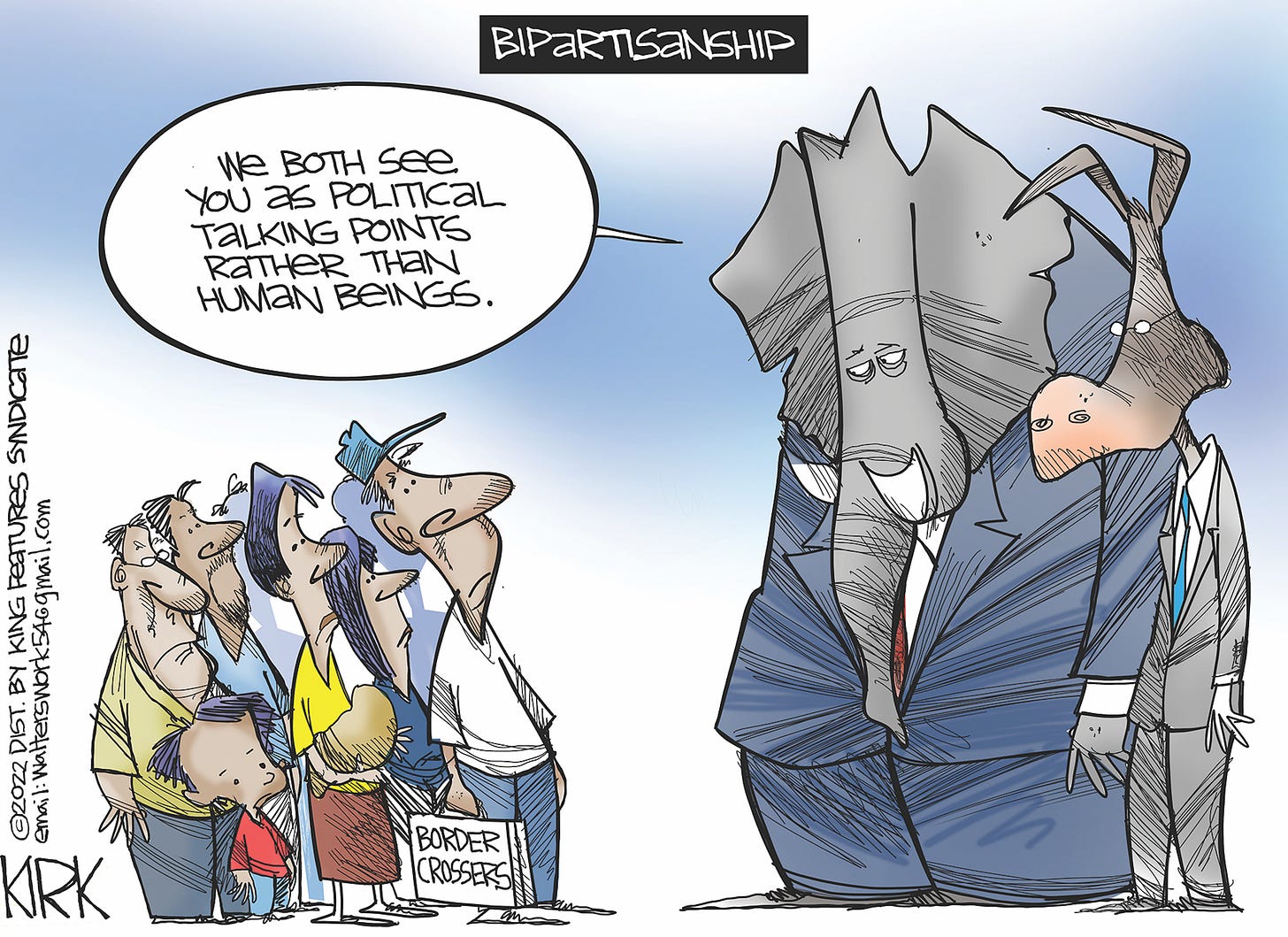America is Facing a Border Crisis
Dear Investors,
Welcome to this week’s edition of the Myth of Money. If you would like to keep in closer touch, please reach out on X (formerly Twitter) below.
Over the last few weeks, the Texas-Mexico border has become a battleground for a complex standoff between Texas state authorities and the federal government. This crisis, rooted in differing approaches to handling immigration and border security, has escalated in recent years, particularly under the Biden administration.
Since the beginning of President Biden's term in January 2021, the U.S. Border Patrol has encountered over 6.3 million illegal immigrant border crossers, with around 58% of these encounters occurring in Texas border sectors. U.S. officials processed more than 302,000 migrants at and in between ports of entry along the southern border last month, an all-time high.
Those supporting illegal immigration argue that the driving force behind this surge is attributed to the strong U.S. labor market demand for cheap foreign labor, coupled with limited legal entry options for lower-skilled immigrants. A lower cost of labor would increase productivity and decrease inflation.
Those against mass illegal border crossings warn against increased terrorism, crime, and even diseases. Tucker Carson has also argued that a new generation of Latin-American voters would change the voting demographic in favor of Democrats.
Some argue that the border policy to Democrats is what abortion policy is to Republicans. Both parties need to radically change course or they stand to lose a large portion of their voting base.
In March 2021, Texas Governor Greg Abbott initiated Operation Lone Star, deploying the Texas National Guard and other state agencies to bolster border security. A contentious point arose with the placement of approximately 70,000 rolls of concertina wire near Eagle Pass by the Texas National Guard, impeding Border Patrol operations. This led to legal battles, with Texas suing the federal government to prevent the removal of the wire and a series of court rulings culminating in a Supreme Court decision that vacated a Fifth Circuit ruling barring Border Patrol from wire removal.
The tension peaked when Texas seized Shelby Park in Eagle Pass, denying Border Patrol access to crucial facilities, including a boat ramp. This action was justified by Governor Abbott as a measure against high levels of illegal immigration. The federal government, led by U.S. Solicitor General Elizabeth Prelogar, argued that this move hindered Border Patrol operations, especially after a tragic incident where a Mexican woman and two children drowned near the park.
Governor Abbott, backed by 25 Republican governors, asserted Texas’s right to defend its border, citing Article I, § 10, Clause 3 of the Constitution. This claim, however, is contested by legal experts who argue that the clause refers to invasions by foreign militaries, not illegal immigration.
President Biden's administration has focused on expanding legal immigration pathways, like the parole program for certain nationalities, to reduce illegal immigration. Despite these efforts, Texas’s actions, including recent legislation to allow state officials to arrest migrants on state-level charges, have created significant legal and humanitarian challenges.
Meanwhile, Dmitry Medvedev, a former Russian president and ally of Vladimir Putin, has openly taunted the Biden administration regarding the escalating Texas border crisis, suggesting a potential "destructive civil confrontation" in the U.S. He criticized President Biden for the high number of migrants at the southern border, referring to Biden as "senile" and ridiculing the U.S.'s internal conflicts and support for Ukraine. Medvedev, who has shifted from a pro-West stance to defending Russia's war in Ukraine, critiqued the U.S.'s unwavering support for Ukraine and linked it to the border crisis, which he mockingly described as symptomatic of American decline.
This ongoing crisis at the Texas-Mexico border is more than a local issue; it reflects deeper national and international concerns about immigration policy, state vs. federal authority, and the humanitarian implications of border security measures. As the situation continues to develop, with potential further legal challenges and political discourse, it remains a critical topic for both policymakers and the public.
This Week By the Numbers 📈
Quick Facts:
Google announces it will permit advertisements for Bitcoin ETFs.
Bitcoin's next halving event is now anticipated to occur on 4/20.
Bitcoin active addresses surpass 800,000, reaching a high not seen in several months.
Research suggests a correlation between the four-year Bitcoin cycles and the global liquidity cycle.
JP Morgan reports that the major selling of Grayscale Bitcoin Trust (GBTC) is largely concluded.
The U.S. government is set to auction off $118 million worth of Bitcoin.
The number of active addresses on Solana (SOL) continues to exceed those of Bitcoin.
Stablecoin transfers on the Solana network now double those on Ethereum.
Pudgy Penguins' popularity soars with 750,000 toys sold worldwide.
Tech stocks reach an all-time high while other sectors decline by 15%.
Oil prices reach new highs since November following additional attacks in the Red Sea.
As inflation rates plummet, the Federal Reserve faces new challenges due to rising real interest rates, and increasing pressure to cut nominal rates.
The core personal consumption expenditures price index, excluding food and energy, slows to a 2.9% increase year-over-year in December.
Consumer spending in the U.S. rises by 0.7% in December, with a real increase of 0.5% after adjusting for inflation.
The U.S. economy experiences a 3.3% annualized growth rate in the last quarter of 2023, building strong momentum for 2024.
Ark Invest's Cathie Wood adds more than $32 million worth of Tesla shares amid 12% sell-off.
Top Stories 🗞️
JPMorgan CEO Jamie Dimon warns US driving toward a cliff as debt snowballs
JPMorgan Chase chairman and CEO Jamie Dimon says the U.S. is speeding toward a cliff as the nation's runaway debt continues to mount, sounding the alarm that the situation needs to be tackled before it results in a crisis. The chief executive of the nation's largest bank issued the warning during a panel discussion at the Bipartisan Policy Center on Friday, when he was asked for his take on what it means for the economy if the federal government fails to address the issue. Dimon began his response by recalling how the economy looked back in 1982, with inflation around 12%, the prime rate around 21.5% and unemployment somewhere around 10%, and the debt was around 35% of gross domestic product. He noted that today, the debt-to-GDP ratio is above 100%, and said it is projected to reach 130% by 2035. "And it's a hockey stick," Dimon said, describing how the debt growth would appear on a chart.
OpenSea’s CEO Says Company Open to Deals, Including Being Acquired
Devin Finzer, the Chief Executive Officer (CEO) of the NFT marketplace OpenSea, hinted the company is open to being acquired as it looks to retake lost market share and reestablish its dominance. Finzer mentioned in an interview that the company is open-minded toward deals, including being acquired. “The honest answer is that we take a pretty open-minded approach,” Finzer said in the interview. “We think that if the right partnership comes along, then that’s something we should certainly consider.” However, the executive maintained that OpenSea is not actively looking for an acquisition nor keeping an eye out for one. Finzer’s statements come amidst a continued struggle by the marketplace to retake lost market shares. Prior to losing its control to Blur, OpenSea accounted for about 90% of the NFT sector’s market share, the report noted. As a result, the platform’s monthly trading volume plunged 96% to $171, data from Dune Analytics reveals.
Australia, Italy and others halt funding to U.N. agency over claim staff involved in Hamas attack on Israel
Several key donor countries to the UN agency for Palestinian refugees joined the U.S. and said on Saturday they would halt their funding following accusations by Israel that several UNRWA staff were involved in Hamas's Oct. 7 attack. The U.S. State Department said on Friday they suspended payments to the organization. The U.S. underlined that "UNRWA plays a critical role in providing lifesaving assistance to Palestinians, including essential food, medicine, shelter, and other vital humanitarian support." The UNRWA is the United Nations humanitarian agency that serves Palestinians.
X is aiming to be the next hub for sports betting
X plans to roll out a new sports betting feature after inking a deal with the digital gambling platform BetMGM, Fortune reported. BetMGM is the online sports betting subsidiary owned by MGM Resorts International, the Las Vegas-based hospitality company behind a roughly $15 billion portfolio of luxury hotels including Bellagio, Mandalay Bay, MGM Grand, and Park MGM. BetMGM, a competitor of gambling platforms like DraftKings and FanDuel, debuted in 2018 following a deal between MGM and UK gambling operator GVC Holdings. While the financial terms of the latest deal were not disclosed, Fortune reported X's new feature will display sports gambling statistics directly on the site, along with a link to test your luck on BetMGM. The deal comes about two weeks before Super Bowl LVIII, which CNN reported is expected to draw in a record 50.4 million US adults betting on the game. These bets will largely take the form of proposition wagers or "prop bets" related to in-game happenings unrelated to the game's outcome.
Saudi Arabia’s first alcohol store is a big step, but also aims to tackle a longstanding problem: Booze smuggling
Saudi Arabia’s first alcohol store has opened in the diplomatic quarter of its capital Riyadh, accessible to non-Muslim diplomats. While it only affects a select group, it’s a big change for the highly conservative Muslim kingdom, where alcohol has been banned since 1952 after a Saudi prince murdered a British diplomat in a drunken rage. Drinking is also forbidden under Islam, and most of Saudi Arabia’s local population is religiously observant. That hasn’t stopped alcohol from flowing into the kingdom over the years — it just happened behind closed doors. Foreign embassies are able to import alcohol under specified agreements with the Saudi government, while some have snuck booze into the kingdom in secure “diplomatic pouches” that can’t be inspected. From there, bottles are often sold on the black market at huge markups, according to expat and local residents of the country. All those who spoke to CNBC did so on condition of anonymity due to the sensitivity of the topic.
My Top 10 Investment Ideas for 2024 🐸
This week, we are offering an additional free knowledge source - My Top 10 Investment Ideas for 2024, including picks across stocks and crypto, and my reasoning behind making those investments personally.
To receive this product, simply refer 3 friends using your unique shareable link 👇
Thank you for reading this week’s edition of the Myth of Money.🚀
Were you forwarded this email? Subscribe below.
Until next week,
Tatiana Koffman
About the Author: Tatiana Koffman
Hi there and thanks for reading! If you stumble upon my newsletter, you will notice that I write about money, economics, and technology. I hold a JD/MBA and spent my career in Capital Markets working across Mergers & Acquisitions, Derivatives, Venture Capital, and Cryptocurrencies. I write to make financial topics more accessible and create equal opportunity for the next generation of investors. I have personally invested in 20+ companies and funds (👉 my portfolio).







